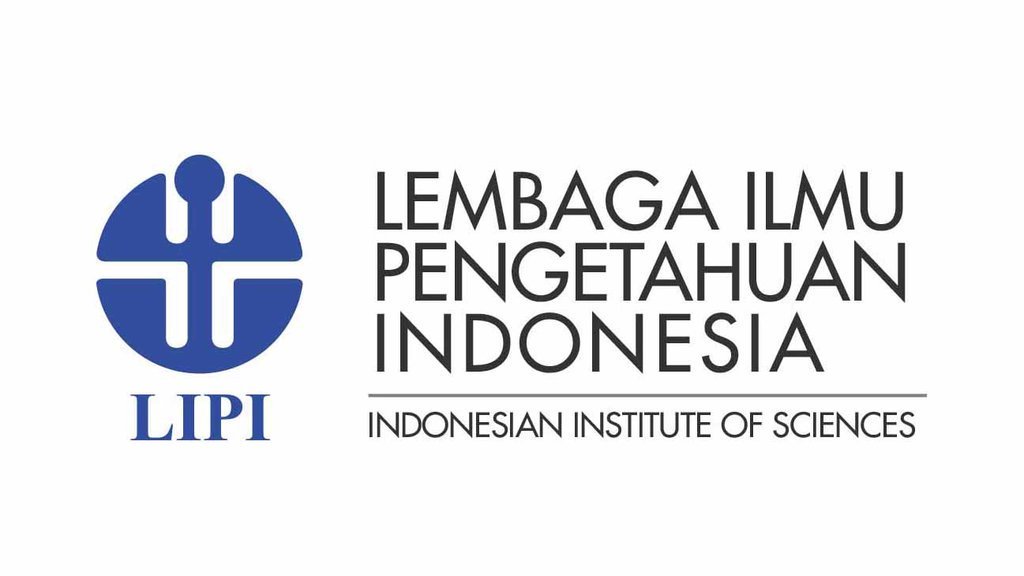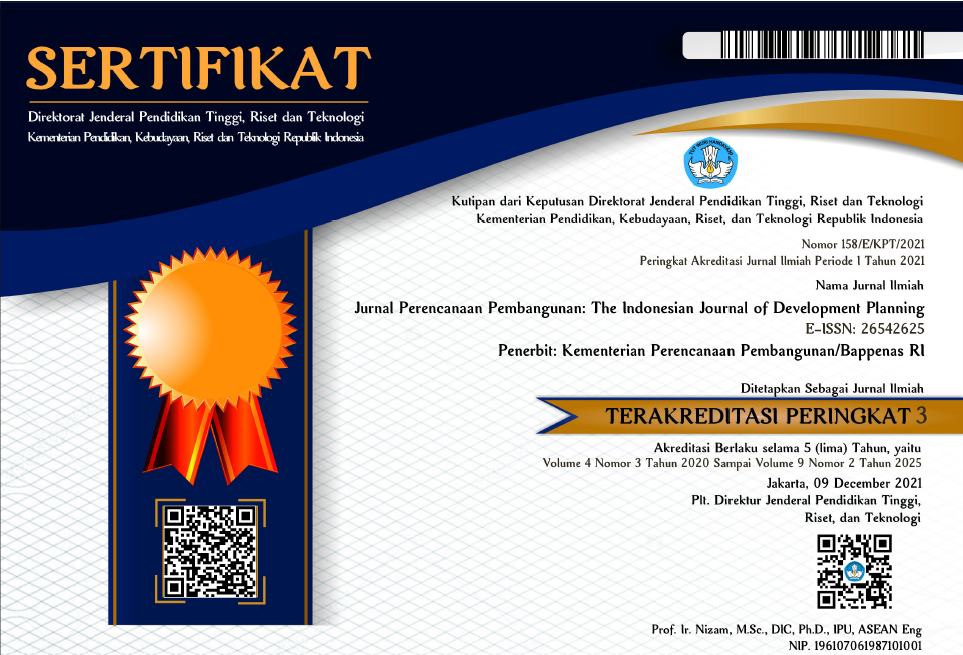The Impact of School Attendance on Child Working: Case from Indonesian School Operational Assistance
DOI:
https://doi.org/10.36574/jpp.v7i1.408Keywords:
education policy, Bantuan Operasional Sekolah (BOS), school operational assistance, fuzzy regression discontinuity, IndonesiaAbstract
Educational subsidies are increasing school attendance, but the impact on the child’s working participation is vague. After running for five years, the government of Indonesia changed the regulation of Bantuan Operasional Sekolah (the BOS program or school operational assistance) to eliminate school fees for all elementary and junior secondary schools in 2009. This study intends to estimate the impact of hours of school attendance on children working using the 2009 regulation BOS program as an instrument. The estimation uses data from the fourth and fifth Indonesia Family Life Survey (IFLS) with Fuzzy Regression Discontinuity Design (FRDD) as methodology. The result presents that the children who benefited from the 2009 regulation BOS program spent more hours attending school than non-beneficiaries. However, the increase in school attendance is increasing the time allocation for income-generating and household work, supporting the idea that working and schooling are not perfectly substitutable.
Downloads
References
Attanasio, O., Fitzsimons, E., Gomez, A., Gutiérrez, M. I., Meghir, C., & Mesnard, A. (2010, January). Children’s schooling and work in the presence of a conditional cash transfer program in Rural Colombia. Economic Development and Cultural Change, 58(2), 181-210.
Calonico, S., Cattaneo, M. D., Farrell, M. H., & Titiunik, R. (2017). rdrobust: Software for regression-discontinuity designs. The Stata Journal , 17(2), 372–404.
Cattaneo, M. D., Idrobo, N., & Titiunik, R. (2020). A Practical Introduction to Regression Discontinuity Designs: Foundations. Cambridge: Cambridge University Press (Elements in Quantitative and Computational Methods for the Social Sciences). doi:10.1017/9781108684606.
Dartanto, T., Moeis, F. R., & Otsubo, S. (2020). Intragenerational economic mobility in Indonesia: A transition from poverty to the middle class in 1993-2014. Bulletin of Indonesian Economic Studies, 56(2), 193-224. doi:10.1080/00074918.2019.165779
Datt, G., & Uhe, L. (2018). A little help may be no help at all: Size of scholarships and child labour in Nepal. The Journal of Development Studies.
de Hoop, J., & Rosati, F. C. (2014). Does promoting school attendance reduce child labour? Evidence from Burkina Faso’s BRIGHT project. Economics of Education Review,, 39, 78-96.
de Hoop, J., Friedman, J., Kandpal, E., & Rosati, F. C. (2019). Child schooling and child work in the presence of a partial education subsidy. The Journal of Human Resources, 54(2), 503-531. doi:10.3368/jhr.54.2.0317.8627R1
Edmonds, E. V., & Schady, N. (2012, November). Poverty allevation and child labour. American Economic Journal: Economic Policy, 4(4), 100-124.
Imbens, G. W., & Lemieux, T. (2008). Regression discontinuity designs: A guide to practice. Journal of Econometrics, 142, 615-635. doi:10.1016/j.jeconom.2007.05.001
International Labour Office & UNICEF. (2021). Child Labour: Global estimates 2020, trends and the road forward. New York: International Labour Office and United Nations Children’s Fund.
Joewono, S. S., Handayani, D., & Dartanto, T. (2021). Freed from child marriage: the impact of School Operational Assistance on child marriage in Indonesia. International Economics Association World Congress 2021.
Kharisma, B. (2016). Can a school operational assistance fund program (BOS) reduce school drop-outs during the post-rising fuel prices in Indonesia? Evidence from Indonesia. Jurnal Ekonomi Pembangunan Kajian Masalah Ekonomi dan Pembangunan.
Kharisma, B., Remi, S. S., & Maharani, D. A. (2021). The impact of Indonesia's school operational assistance program on the transition rate from primary to junior secondary school. Monitoring of Public Opinion: Economic and Social Changes, 474-492.
Kozhaya, M., & Flores, F. M. (2022). School attendance and child labor: Evidence from Mexico’s Full-Time School program. Economics of Education Review, 90, 1-23.
Law No. 13 of 2003 on Labour, the State Gazette of the Republic of Indonesia Year 2003 No. 39; Gazette of the Republic of Indonesia No. 4279, [Undang-undang Republik Indonesia Nomor 13 Tahun 2003 tentang Ketenagakerjaan].
Law No. 20 of 2003 on National Education System, the State Gazette of the Republic of Indonesia Year 2003 No. 4301, [Undang-Undang Republik Indonesia Nomor 20 Tahun 2003 Sistem Pendidikan Nasional].
Lee, D. S., & Lemieux, T. (2010). Regression discontinuity designs in economics. Journal of Economic Literature, 48(2), 281-355.
Lewis, B. D., & Nguyen, H. T. (2020). Assessing the causal impact of compulsory schooling policy in Indonesia. International Journal of Educational Research, 104. doi:https://doi.org/10.1016/j.ijer.2020.101693
Ministry of Manpower of Republic of Indonesia. (2014). Roadmap towards a child labour free Indonesia in 2022. Jakarta: Ministry of Manpower of Republic of Indonesia.
Opoku, K., & Boahen, E. A. (2021). Effects of school attendance on child labour and literacy: regression discontinuity evidence from Ghana. International Journal of Social Economics, 48(11), 1567-1588. doi:10.1108/IJSE-09-2020-0669
Orrnert, A. (2018). Impact of Education Interventions for Working Children, K4D Helpdesk Report. Brighton, UK: Institute of Development Studies.
Ravallion, M., & Wodon, Q. (2000). Does child labour displace schooling? Evidence on behavioural responses to an enrollment subsidy. The Economic Journal, 110, C158-C175.
Skoufias, E., & Parker, S. W. (2001). Conditional cash transfers and their impact on child work and schooling: Evidence from the PROGRESA Program in Mexico. Economía, 2(1), 45-96.
SMERU. (2006). Kajian cepat PKPS-BBM bidang pendidikan: Bantuan Operasional Sekolah (BOS) 2005. Jakarta: Lembaga Penelitian SMERU.
Statistics Indonesia. (2021). Mid Year Population. Retrieved October 27, 2022, from https://www.bps.go.id/indicator/12/1975/1/mid-year-population.html
Statistics Indonesia. (2021). Number of Children Out of School by Education Level and Area of Residence . Retrieved October 27, 2022, from https://www.bps.go.id/indicator/28/1984/1/number-of-children-out-of-school-by-education-level-and-area-of-residence.html
Statistics Indonesia. (2021). Number of Poor People (Thousand People) by Province and Area. Retrieved October 27, 2022, from https://www.bps.go.id/indicator/23/185/1/number-of-poor-people-thousand-people-by-province-and-area.html
Statistics Indonesia. (2021, September 16). Percentage of child workers aged 10-17 years by gender (percent), 2019-2021. Retrieved October 27, 2022, from Statistics Indonesia: https://www.bps.go.id/indicator/6/2009/1/percentage-of-child-workers-aged-10-17-years-by-gender.html
Statistics Indonesia. (2021). School Participation Rate ( S P R ) . Retrieved October 27, 2022, from https://www.bps.go.id/indicator/28/301/1/school-participation-rate-s-p-r-.html
The World Bank. (2014). Assessing the role of the School Operational Grant program (BOS) in improving education outcomes in Indonesia. Jakarta, Indonesia: The Word Bank Office Jakarta.
The World Bank. (2022). Primary school starting age (years) - Indonesia. Retrieved October 28, 200, from https://data.worldbank.org/indicator/SE.PRM.AGES?locations=ID
Thévenon, O., & Edmonds, E. (2019). Child labour: Causes, consequences and policies to tackle it. OECD Social, Employment and Migration Working Papers, 235.
Downloads
Published
How to Cite
Issue
Section
License
This is an open-access article distributed under the terms of the Creative Commons Attribution-NonCommercial-ShareAlike 4.0 International License. Copyright © Kementerian PPN/Bappenas RI


















